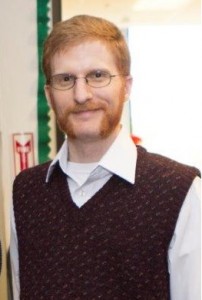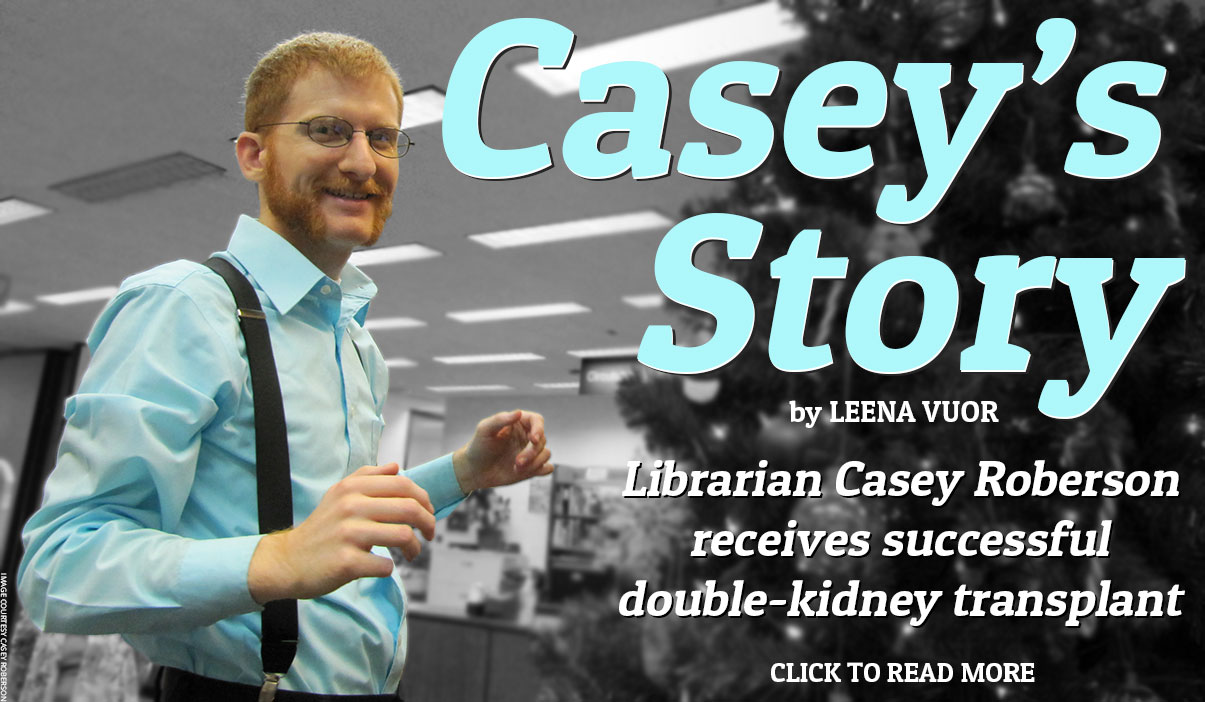Librarian receives successful double-kidney transplant

UHCL’s Alfred R. Neumann Library Research and Instruction Librarian Casey Roberson no longer depends on a dialysis machine after recently undergoing a successful double-kidney transplant.
Roberson, 30, was diagnosed with kidney disease in 2011 at the age of 26.
Kidney failure does not present many symptoms that are noticeable. The most obvious symptom is persistent itching in the lower legs. It was not symptoms of kidney failure that brought him to go to the emergency room but the fact that he got food poisoning.
“I got sicker than normal from food poisoning,” Roberson said. “I started seeing spots in front of one of my eyes; being a visual artist, this scared me and prompted me to visit the emergency room.”
After waiting for hours, feverish and tired, the staff at the emergency room took his vitals and blood and determined something was off.
“Scans determined that my kidneys had shrunk by a number of inches, and were operating at only about 9 percent of regular function,” Roberson said.
The diagnoses came as a surprise; there is no history of kidney disease on either side of his family. By August 2011, he began peritoneal dialysis, which involves having a catheter surgically implanted in his abdomen. The fluid pulls the waste product from the blood across the peritoneum, after which the machine drains the fluid back.
“There is no cure for kidney disease,” Roberson said. “The things that can be done for diseased kidneys — dialysis and kidney transplant — are only short-term solutions. No matter what, I would have kidney disease for the rest of my life.”
His main struggle while being on dialysis was not having enough time.
“I had to be hooked up to my dialysis machine for eight hours every night,” Roberson said. “My weekends typically filled with activities ancillary to doing dialysis — dialysis supplies generate a tremendous amount of trash; there were parts of my apartment that had to be cleaned constantly.”
Roberson was on dialysis for three-and-half years and often times felt depressed.
“Dealing with depression often involves taking one’s mind off one’s problems; there’s nothing like a good routine to let you mindlessly go through the motions,” Roberson said. “You think about what you’re doing and what you’re going to do next, rather than what you can’t do.”
One main thing Roberson had to do was to get his name on the transplant list. The process is complicated and takes many test and scans to see if one is suitable to care for new kidneys. The hospital wants to determine if there are other diseases present and decide whether one is compliant to doctor’s orders in maintaining dialysis and medications. Once on the list, the next step is to wait.
On Jan. 3, Roberson received a phone call from the hospital informing him that there was a pair of pediatric kidneys that would be a good match for him. The following afternoon he was prepped for surgery.
The first month of post-transplant is the most crucial period. There are many precautions to make sure that the body does not reject the transplanted kidneys. The main things is to begin taking immunosuppressant medications to fight off possible infections, check vitals regularly and to eat healthy.
Since his surgery, Roberson enjoys staying up as late as he wants and working on comics (www.jimmyjone.com).
“Part of this hobby [comics] includes writing with two close friends of mine,” Roberson said. “The creative process for us is mostly trying to outdo each other’s jokes, but a lot of what I like about writing is making various otherwise disparate aspects of story fit together in unexpected ways, which nonetheless feel ‘right.’”
Roberson has worked for UHCL since 2012 and is excited to return. Research and instruction librarians have the responsibility to develop and maintain the library collection and data bases. Other responsibilities include keeping in touch with faculty members to make sure relevant materials are available for related course work and research. They also provide one-on-one consultation sessions with students and whole classes.
“I can honestly say that this is the best job I have ever had,” Roberson said. “There is more opportunity here to affect change, resolve problems, and create something new and useful. I also get to interact with and help students on a daily basis, which is very rewarding.”
Although Roberson’s insurance covers the majority of the medical costs, there are a number of related expenses, for which he is responsible.
“Anyone with experience as a health care patient knows that insurance does not cover everything, and in fact, sometimes the out-of-pocket bill is quite expensive,” said Clarke Iakovakis, research and instruction librarian at Neumann Library. “This is especially the case when factoring in the cost of medications and expenses for caregivers.”
Roberson created his own fundraising site to help offset some of the out-of-pocket medical costs Many of his colleagues and friends have been advocating the need for donations.
In an email sent to fellow UHCL employees, Martha Steele, associate director, public services at Neumann Library, made a special appeal for help on Roberson’s behalf.
“Casey has saved his money and his vacation leave for all the years that he has been on the list for a donated kidney, however, the continuing cost of anti-rejection drugs, which Casey will have to take to maintain the donated kidneys, plus other expenses not covered by insurance, are stress and hardship for him,” Steele said. “Knowing the generosity if the UHCL community, we do not hesitate to ask for your help. Even a few dollars would make a big difference. Thank you so much for considering this request and offering to Casey whatever level of assistance you can.”
Roberson has some advice for anyone who is dealing with the same situation.
“Find a good routine, and give yourself breaks from it every now and then,” Roberson said. “Don’t wait to get on the kidney transplant list, let people know what you’re going through and accept whatever help is offered to you.”
For more information on Casey Roberson and/or how to make a donation toward his medical expenses, visit the following website: https://caseyskidneys.wordpress.com.
Video shot and edited by The Signal reporter Leena Vuor.

